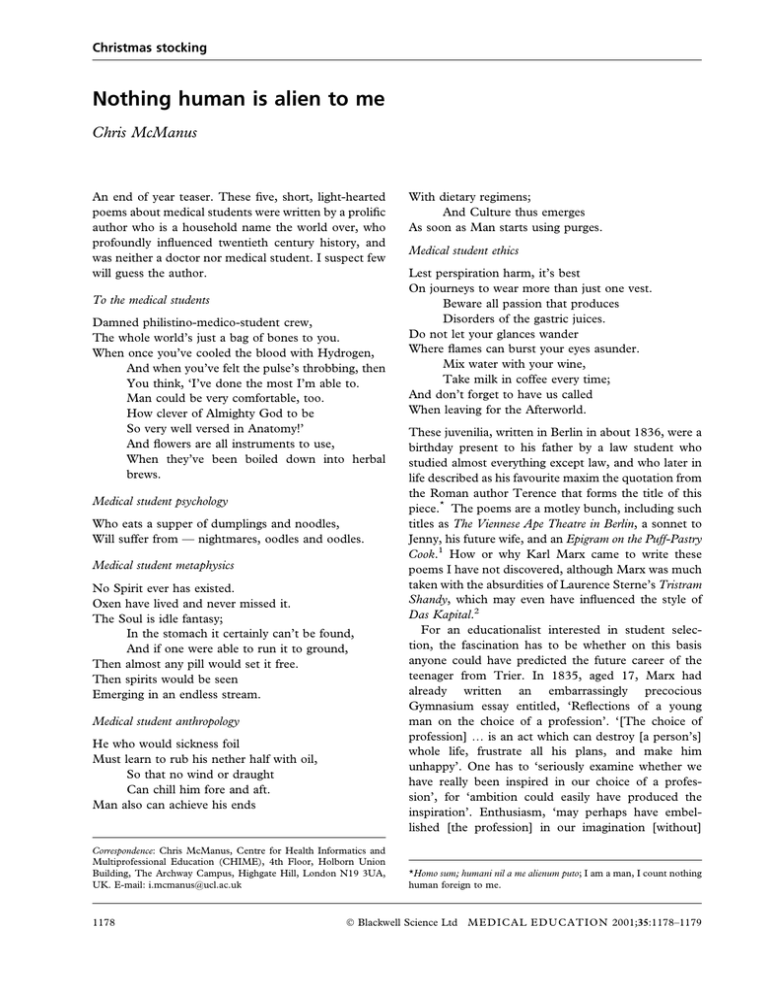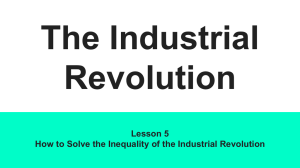Nothing human is alien to me Chris McManus
advertisement

Christmas stocking Nothing human is alien to me Chris McManus An end of year teaser. These ®ve, short, light-hearted poems about medical students were written by a proli®c author who is a household name the world over, who profoundly in¯uenced twentieth century history, and was neither a doctor nor medical student. I suspect few will guess the author. To the medical students Damned philistino-medico-student crew, The whole world's just a bag of bones to you. When once you've cooled the blood with Hydrogen, And when you've felt the pulse's throbbing, then You think, `I've done the most I'm able to. Man could be very comfortable, too. How clever of Almighty God to be So very well versed in Anatomy!' And ¯owers are all instruments to use, When they've been boiled down into herbal brews. Medical student psychology Who eats a supper of dumplings and noodles, Will suffer from Ð nightmares, oodles and oodles. Medical student metaphysics No Spirit ever has existed. Oxen have lived and never missed it. The Soul is idle fantasy; In the stomach it certainly can't be found, And if one were able to run it to ground, Then almost any pill would set it free. Then spirits would be seen Emerging in an endless stream. Medical student anthropology He who would sickness foil Must learn to rub his nether half with oil, So that no wind or draught Can chill him fore and aft. Man also can achieve his ends Correspondence: Chris McManus, Centre for Health Informatics and Multiprofessional Education (CHIME), 4th Floor, Holborn Union Building, The Archway Campus, Highgate Hill, London N19 3UA, UK. E-mail: i.mcmanus@ucl.ac.uk 1178 With dietary regimens; And Culture thus emerges As soon as Man starts using purges. Medical student ethics Lest perspiration harm, it's best On journeys to wear more than just one vest. Beware all passion that produces Disorders of the gastric juices. Do not let your glances wander Where ¯ames can burst your eyes asunder. Mix water with your wine, Take milk in coffee every time; And don't forget to have us called When leaving for the Afterworld. These juvenilia, written in Berlin in about 1836, were a birthday present to his father by a law student who studied almost everything except law, and who later in life described as his favourite maxim the quotation from the Roman author Terence that forms the title of this piece.* The poems are a motley bunch, including such titles as The Viennese Ape Theatre in Berlin, a sonnet to Jenny, his future wife, and an Epigram on the Puff-Pastry Cook.1 How or why Karl Marx came to write these poems I have not discovered, although Marx was much taken with the absurdities of Laurence Sterne's Tristram Shandy, which may even have in¯uenced the style of Das Kapital.2 For an educationalist interested in student selection, the fascination has to be whether on this basis anyone could have predicted the future career of the teenager from Trier. In 1835, aged 17, Marx had already written an embarrassingly precocious Gymnasium essay entitled, `Re¯ections of a young man on the choice of a profession'. `[The choice of profession] ¼ is an act which can destroy [a person's] whole life, frustrate all his plans, and make him unhappy'. One has to `seriously examine whether we have really been inspired in our choice of a profession', for `ambition could easily have produced the inspiration'. Enthusiasm, `may perhaps have embellished [the profession] in our imagination [without] *Homo sum; humani nil a me alienum puto; I am a man, I count nothing human foreign to me. Ó Blackwell Science Ltd ME D I C A L E DU C A T I O N 2001;35:1178±1179 Nothing human is alien to me · C McManus consider[ing] the whole burden, the great responsibility it imposes upon us'. Nevertheless, the right profession should `offer us the widest scope to work for mankind'. The tension between ideas and practice is well seen when he talks of those dangerous professions `which are not so much involved in life itself as concerned with abstract truths'. Despite training as a philosopher, Marx's own eventual concern was with the practical world, for as he later said, 1179 `The philosophers have only interpreted the world, in various ways; the point is to change it'. References 1 Marx K. Karl Marx, Frederick Engels, Collected works, Vol I: Karl Marx. London: Lawrence and Wishart; 1975: pp. 1835±43. 2 Wheen F. Karl Marx. London: Fourth Estate; 1999. Ó Blackwell Science Ltd ME D I C AL ED U C AT I ON 2001;35:1178±1179






